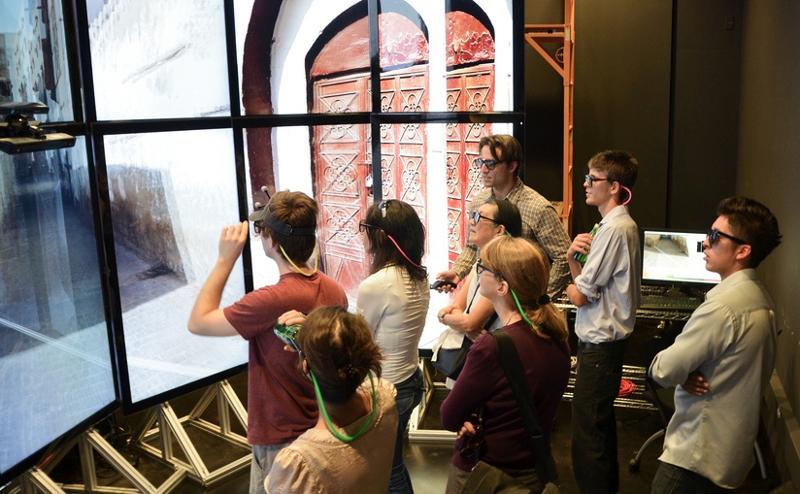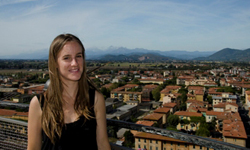Cultural Heritage Center at UC San Diego Reports Progress in 2012
San Diego, Nov. 21, 2012 -- The number of Ph.D. students participating in the Center of Interdisciplinary Science for Art, Architecture and Archaeology (CISA3) has risen in the past year from six to 19, thanks to support from private donors and from the National Science Foundation through its Integrative Graduate Education and Research Traineeship (IGERT) grant to a project for engineering in cultural heritage diagnostics. The two-year-old IGERT project has also produced a dozen alumni -- including four who have gone on to become professors in their respective disciplines.
|
“CISA3 has gone through a remarkable growth period, which truly came into focus during our five-year anniversary celebration earlier this year,” said Kuester, thanking donors and friends of the center for their “participation, passion and support towards creating a future for the past.”
Many of the graduate students funded as IGERT Trainees are participating in a “Cyber-Archaeology Field School” and expedition in Jordan this fall, led by CISA3 Associate Director Thomas E. Levy. They are collecting data and artifacts for their research, while deploying and testing new technologies and methodologies in the wild – technologies they have been developing over the past year. The team returns to San Diego in late November with what Kuester describes as “a series of remarkable discoveries.”
Further evidence of CISA3’s global reach can be seen in the number of faculty and Ph.D. students giving talks and co-authoring papers for conferences stretching from Honolulu to Cyprus:
- Christine Wittich and Richard Wood traveled to Cyprus this month to present research papers at the International Conference on Cultural Heritage (EUROMED 2012). The papers co-authored with Tara Hutchinson and Falko Kuester included “Characterizing Cracks in the Frescoes of Sala degli Elementi within Florence’s Palazzo Vecchio,” and “A Methodology for Integrative Documentation and Characterization of Culturally Important Statues to Support Seismic Analysis.”
- Samantha Stout, Tom Wypych and Kathleen Bennallack traveled to the Denver X-ray Conference (DXC) in Colorado to present their research co-authored with Maurizio Seracini, Falko Kuester, Tara Hutchinson, Tom Levy, Vid Petrovic in the Section in Applications for Cultural Heritage Research. The papers included “X-ray Fluorescience (XRF) Assisted, Multispectral Imaging of Historic Drawings” (by Stout, Petrovic, Kuester and Seracini); “Progressive Structural Decomposition Analysis Using In-Situ Digital Radiography” (Wypych, Hutchinson and Kuester); and “Applications of PXRF for Cultural Heritage Diagnostics: Rapid In-Field Analysis at Khirbat Faynan” (Bennallack, Levy and anthropology grad student Lauren Hahn).
- Yuma Matsui traveled to Washington, D.C., to present “ArchaeoSTOR Map: Publishing Archaeological Geodata on the Web,” co-authored with Aaron Gidding, Tom Levy, Falko Kuester, and Tom DeFanti. The paper was delivered at the International Conference on Computing for Geospatial Research and Applications (COM.Geo'12) in July.
- Matsui also traveled to Honolulu to present research at the IEEE International Conference on Cloud Computing (CLOUD 2012). The paper on “Portable Data Management Cloud for Field Science” was co-authored by Gidding, Levy, Kuester and DeFanti.
- Andrew Huynh presented research co-authored with Albert Lin at the 10th International Workshop on Remote Sensing for Disaster Management in Sendai, Japan.
Traveling to Edinburgh, Scotland, CISA3’s Maurizio Seracini – who leads the center’s high-profile projects in Italy and is co-principal investigator on the NSF IGERT project in engineering for cultural heritage diagnostics – delivered a talk on “The Secret Lives of Paintings” at TEDGLOBAL 2012. The event is the most prestigious of international TED conferences, and Seracini’s talk is now available via streaming video on the TED website.
Also over the summer, Tom Levy spoke at the TEDxSonomaCounty event about CISA3’s cyber-archaeology vision and how it is advancing and transforming archaeology. His talk on “Cyber-Archaeology in a Holy Land” is now available on YouTube’s TEDx channel.
|
“Christine’s experiments are just one example of the impactful research being done by our IGERT Trainees,” said Kuester. “We believe that our future lies in this next generation of innovators.”
Kuester also thanked donors for their support, and laid out some areas where funding can make a difference, particularly in the lives of UC San Diego students: for example, $1,000 provides one quarter of foreign language and art history instruction for grad students doing field work abroad; $3,000 would fund one field expedition for a student, staffer or faculty member; and fellowships ranging from $10,000 (for one quarter of field school and lab work for a student), to $50,000 (for one full year of support for a graduate student).
For other ways to support CISA3 and its students, contact Calit2’s Sarah Beckman at sbeckman@ucsd.edu or call her at 858-534-7320.
Related Links
Media Contacts
Doug Ramsey, 858-822-5825, dramsey@ucsd.edu


